Semester 2 BUSN1019 Assignment: Partnership Law Issues
VerifiedAdded on 2023/06/07
|9
|2011
|128
Homework Assignment
AI Summary
This assignment analyzes a business law case involving a brewing partnership between Zac and Todd. The paper addresses key issues such as the existence of a partnership, the sharing of profits, and the application of the Partnership Act 1891. It examines arguments for and against the partnership's existence, Zac's entitlement to profits from selling beer, liability for outstanding rent, potential compensation liabilities, and the validity of Zac's departure from the partnership. The assignment also considers the ownership of assets like brewing equipment and the recipe. The analysis incorporates relevant legal principles, case law (Smith v Anderson, Duke Group Ltd v Pilmer, Kelly v Kelly, and Wang v Rong), and statutory provisions to arrive at conclusions regarding each issue presented. The assignment provides a comprehensive understanding of partnership law and its practical application in a business context.
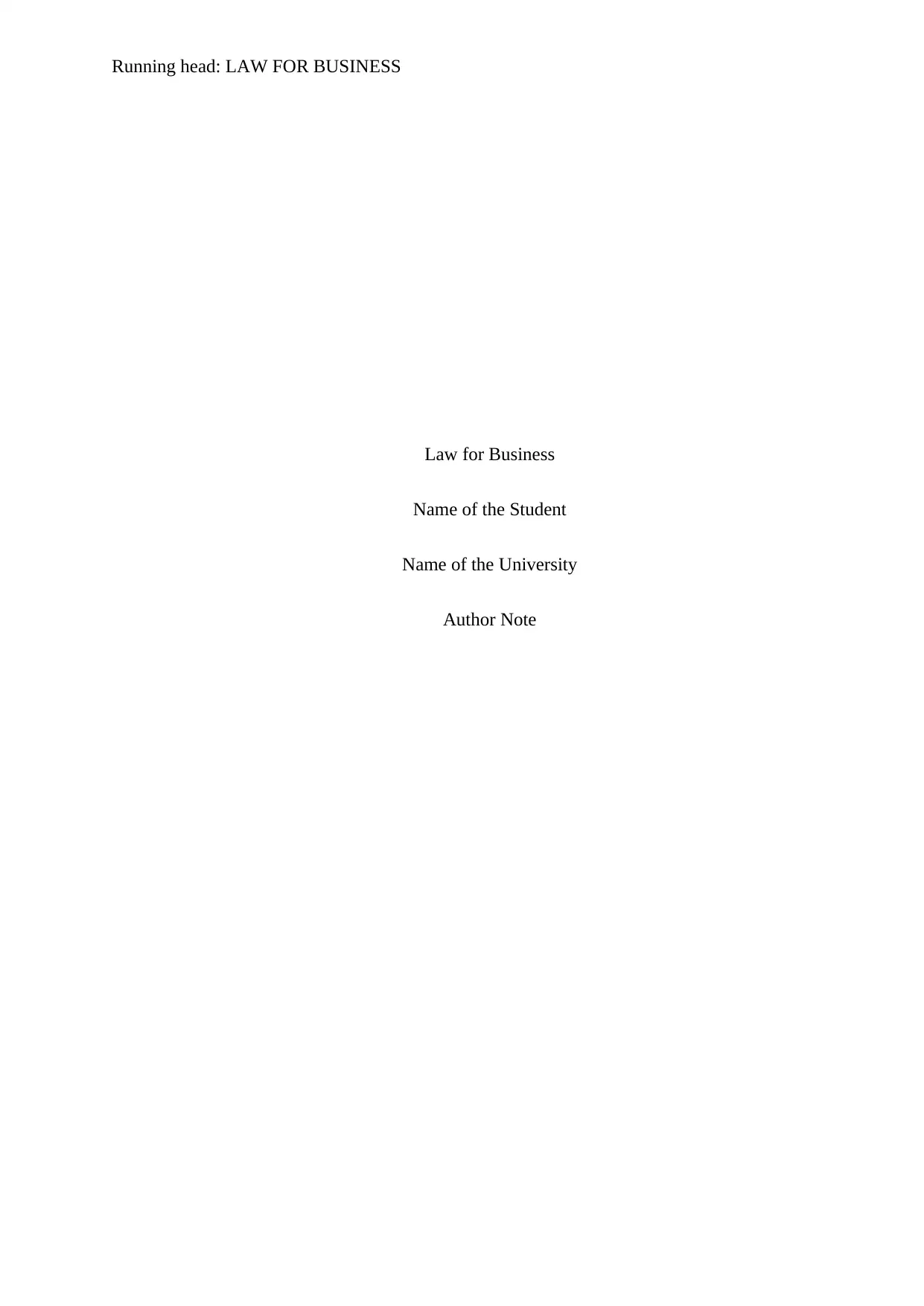
Running head: LAW FOR BUSINESS
Law for Business
Name of the Student
Name of the University
Author Note
Law for Business
Name of the Student
Name of the University
Author Note
Paraphrase This Document
Need a fresh take? Get an instant paraphrase of this document with our AI Paraphraser
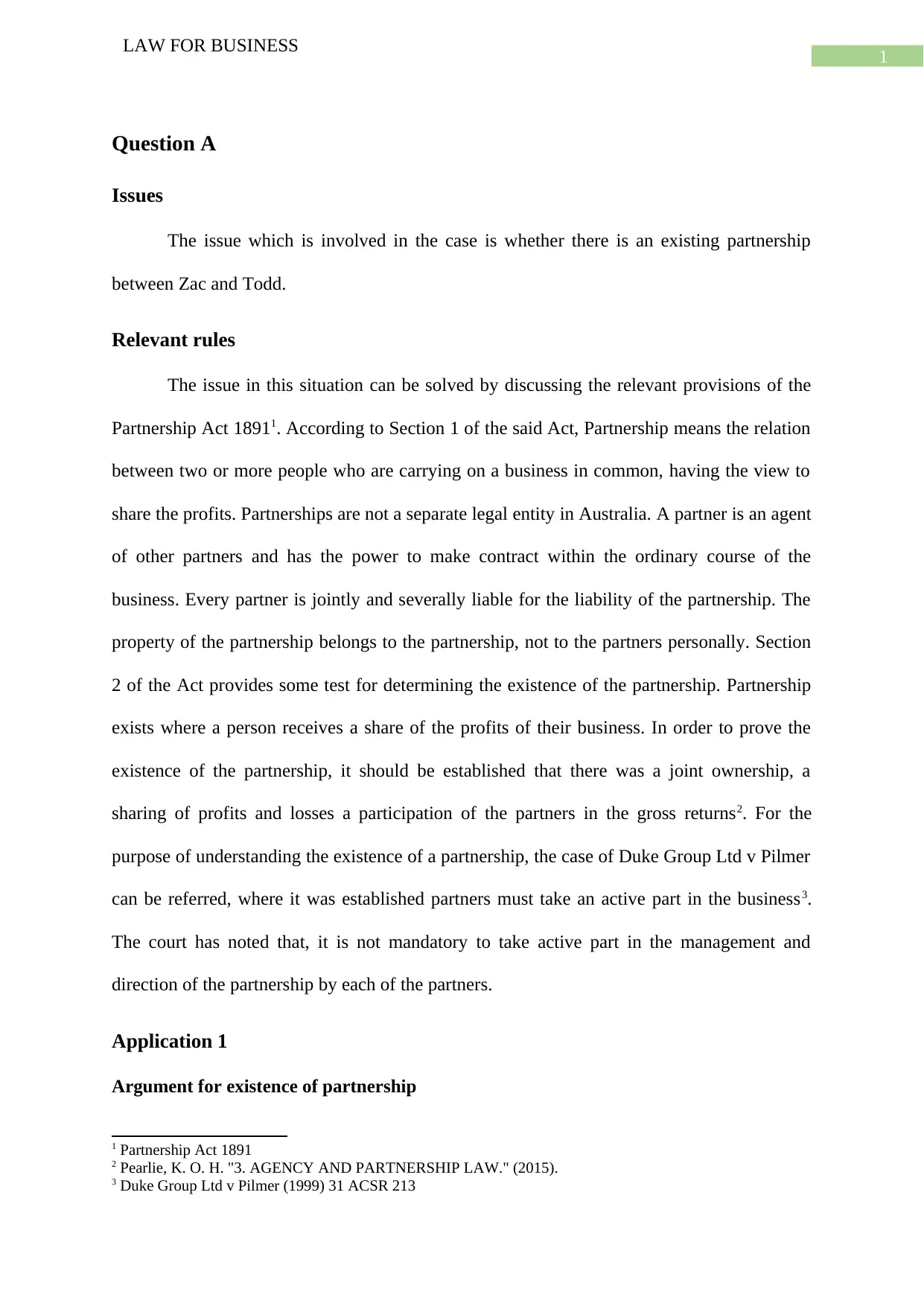
1
LAW FOR BUSINESS
Question A
Issues
The issue which is involved in the case is whether there is an existing partnership
between Zac and Todd.
Relevant rules
The issue in this situation can be solved by discussing the relevant provisions of the
Partnership Act 18911. According to Section 1 of the said Act, Partnership means the relation
between two or more people who are carrying on a business in common, having the view to
share the profits. Partnerships are not a separate legal entity in Australia. A partner is an agent
of other partners and has the power to make contract within the ordinary course of the
business. Every partner is jointly and severally liable for the liability of the partnership. The
property of the partnership belongs to the partnership, not to the partners personally. Section
2 of the Act provides some test for determining the existence of the partnership. Partnership
exists where a person receives a share of the profits of their business. In order to prove the
existence of the partnership, it should be established that there was a joint ownership, a
sharing of profits and losses a participation of the partners in the gross returns2. For the
purpose of understanding the existence of a partnership, the case of Duke Group Ltd v Pilmer
can be referred, where it was established partners must take an active part in the business3.
The court has noted that, it is not mandatory to take active part in the management and
direction of the partnership by each of the partners.
Application 1
Argument for existence of partnership
1 Partnership Act 1891
2 Pearlie, K. O. H. "3. AGENCY AND PARTNERSHIP LAW." (2015).
3 Duke Group Ltd v Pilmer (1999) 31 ACSR 213
LAW FOR BUSINESS
Question A
Issues
The issue which is involved in the case is whether there is an existing partnership
between Zac and Todd.
Relevant rules
The issue in this situation can be solved by discussing the relevant provisions of the
Partnership Act 18911. According to Section 1 of the said Act, Partnership means the relation
between two or more people who are carrying on a business in common, having the view to
share the profits. Partnerships are not a separate legal entity in Australia. A partner is an agent
of other partners and has the power to make contract within the ordinary course of the
business. Every partner is jointly and severally liable for the liability of the partnership. The
property of the partnership belongs to the partnership, not to the partners personally. Section
2 of the Act provides some test for determining the existence of the partnership. Partnership
exists where a person receives a share of the profits of their business. In order to prove the
existence of the partnership, it should be established that there was a joint ownership, a
sharing of profits and losses a participation of the partners in the gross returns2. For the
purpose of understanding the existence of a partnership, the case of Duke Group Ltd v Pilmer
can be referred, where it was established partners must take an active part in the business3.
The court has noted that, it is not mandatory to take active part in the management and
direction of the partnership by each of the partners.
Application 1
Argument for existence of partnership
1 Partnership Act 1891
2 Pearlie, K. O. H. "3. AGENCY AND PARTNERSHIP LAW." (2015).
3 Duke Group Ltd v Pilmer (1999) 31 ACSR 213
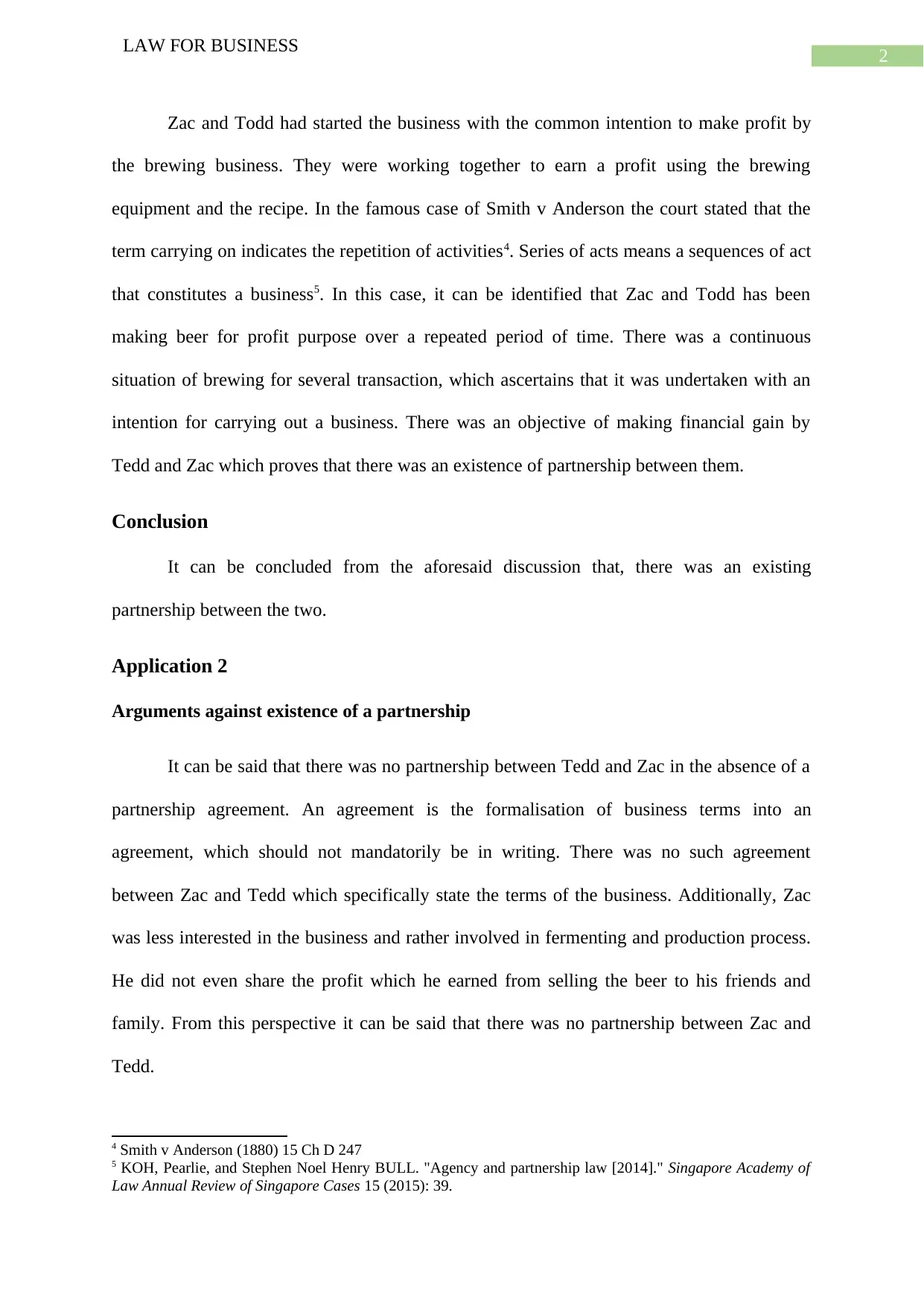
2
LAW FOR BUSINESS
Zac and Todd had started the business with the common intention to make profit by
the brewing business. They were working together to earn a profit using the brewing
equipment and the recipe. In the famous case of Smith v Anderson the court stated that the
term carrying on indicates the repetition of activities4. Series of acts means a sequences of act
that constitutes a business5. In this case, it can be identified that Zac and Todd has been
making beer for profit purpose over a repeated period of time. There was a continuous
situation of brewing for several transaction, which ascertains that it was undertaken with an
intention for carrying out a business. There was an objective of making financial gain by
Tedd and Zac which proves that there was an existence of partnership between them.
Conclusion
It can be concluded from the aforesaid discussion that, there was an existing
partnership between the two.
Application 2
Arguments against existence of a partnership
It can be said that there was no partnership between Tedd and Zac in the absence of a
partnership agreement. An agreement is the formalisation of business terms into an
agreement, which should not mandatorily be in writing. There was no such agreement
between Zac and Tedd which specifically state the terms of the business. Additionally, Zac
was less interested in the business and rather involved in fermenting and production process.
He did not even share the profit which he earned from selling the beer to his friends and
family. From this perspective it can be said that there was no partnership between Zac and
Tedd.
4 Smith v Anderson (1880) 15 Ch D 247
5 KOH, Pearlie, and Stephen Noel Henry BULL. "Agency and partnership law [2014]." Singapore Academy of
Law Annual Review of Singapore Cases 15 (2015): 39.
LAW FOR BUSINESS
Zac and Todd had started the business with the common intention to make profit by
the brewing business. They were working together to earn a profit using the brewing
equipment and the recipe. In the famous case of Smith v Anderson the court stated that the
term carrying on indicates the repetition of activities4. Series of acts means a sequences of act
that constitutes a business5. In this case, it can be identified that Zac and Todd has been
making beer for profit purpose over a repeated period of time. There was a continuous
situation of brewing for several transaction, which ascertains that it was undertaken with an
intention for carrying out a business. There was an objective of making financial gain by
Tedd and Zac which proves that there was an existence of partnership between them.
Conclusion
It can be concluded from the aforesaid discussion that, there was an existing
partnership between the two.
Application 2
Arguments against existence of a partnership
It can be said that there was no partnership between Tedd and Zac in the absence of a
partnership agreement. An agreement is the formalisation of business terms into an
agreement, which should not mandatorily be in writing. There was no such agreement
between Zac and Tedd which specifically state the terms of the business. Additionally, Zac
was less interested in the business and rather involved in fermenting and production process.
He did not even share the profit which he earned from selling the beer to his friends and
family. From this perspective it can be said that there was no partnership between Zac and
Tedd.
4 Smith v Anderson (1880) 15 Ch D 247
5 KOH, Pearlie, and Stephen Noel Henry BULL. "Agency and partnership law [2014]." Singapore Academy of
Law Annual Review of Singapore Cases 15 (2015): 39.
⊘ This is a preview!⊘
Do you want full access?
Subscribe today to unlock all pages.

Trusted by 1+ million students worldwide
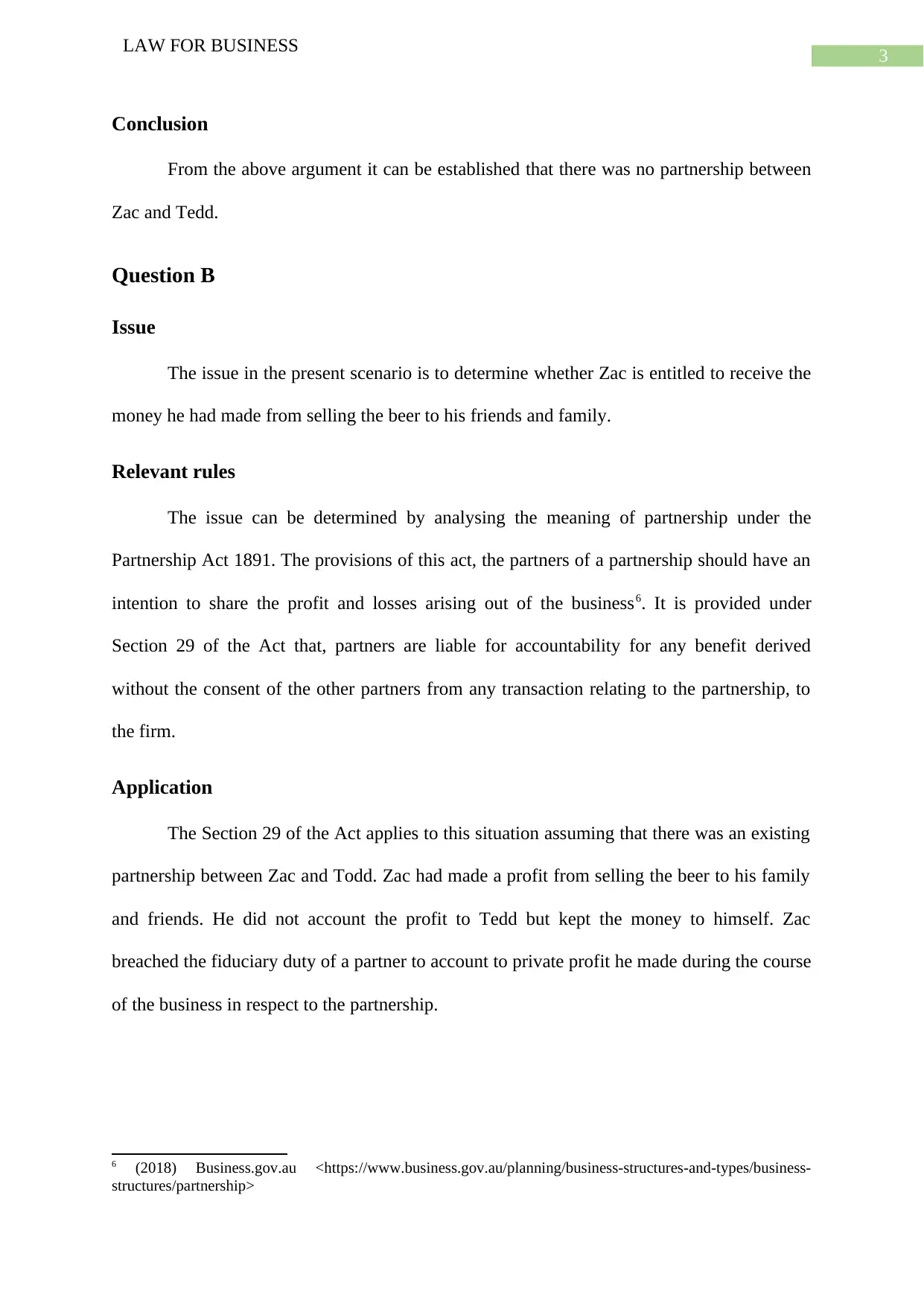
3
LAW FOR BUSINESS
Conclusion
From the above argument it can be established that there was no partnership between
Zac and Tedd.
Question B
Issue
The issue in the present scenario is to determine whether Zac is entitled to receive the
money he had made from selling the beer to his friends and family.
Relevant rules
The issue can be determined by analysing the meaning of partnership under the
Partnership Act 1891. The provisions of this act, the partners of a partnership should have an
intention to share the profit and losses arising out of the business6. It is provided under
Section 29 of the Act that, partners are liable for accountability for any benefit derived
without the consent of the other partners from any transaction relating to the partnership, to
the firm.
Application
The Section 29 of the Act applies to this situation assuming that there was an existing
partnership between Zac and Todd. Zac had made a profit from selling the beer to his family
and friends. He did not account the profit to Tedd but kept the money to himself. Zac
breached the fiduciary duty of a partner to account to private profit he made during the course
of the business in respect to the partnership.
6 (2018) Business.gov.au <https://www.business.gov.au/planning/business-structures-and-types/business-
structures/partnership>
LAW FOR BUSINESS
Conclusion
From the above argument it can be established that there was no partnership between
Zac and Tedd.
Question B
Issue
The issue in the present scenario is to determine whether Zac is entitled to receive the
money he had made from selling the beer to his friends and family.
Relevant rules
The issue can be determined by analysing the meaning of partnership under the
Partnership Act 1891. The provisions of this act, the partners of a partnership should have an
intention to share the profit and losses arising out of the business6. It is provided under
Section 29 of the Act that, partners are liable for accountability for any benefit derived
without the consent of the other partners from any transaction relating to the partnership, to
the firm.
Application
The Section 29 of the Act applies to this situation assuming that there was an existing
partnership between Zac and Todd. Zac had made a profit from selling the beer to his family
and friends. He did not account the profit to Tedd but kept the money to himself. Zac
breached the fiduciary duty of a partner to account to private profit he made during the course
of the business in respect to the partnership.
6 (2018) Business.gov.au <https://www.business.gov.au/planning/business-structures-and-types/business-
structures/partnership>
Paraphrase This Document
Need a fresh take? Get an instant paraphrase of this document with our AI Paraphraser
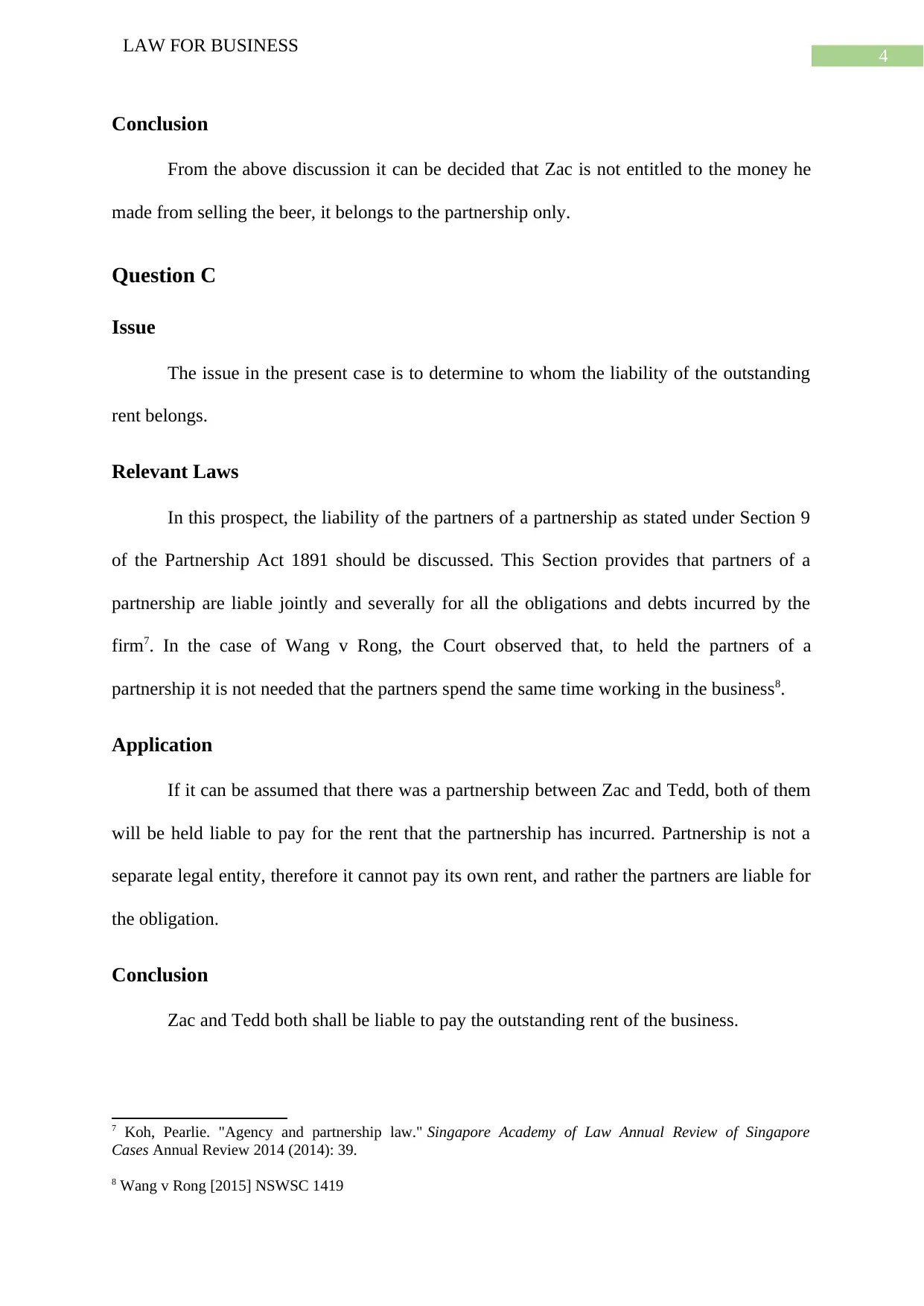
4
LAW FOR BUSINESS
Conclusion
From the above discussion it can be decided that Zac is not entitled to the money he
made from selling the beer, it belongs to the partnership only.
Question C
Issue
The issue in the present case is to determine to whom the liability of the outstanding
rent belongs.
Relevant Laws
In this prospect, the liability of the partners of a partnership as stated under Section 9
of the Partnership Act 1891 should be discussed. This Section provides that partners of a
partnership are liable jointly and severally for all the obligations and debts incurred by the
firm7. In the case of Wang v Rong, the Court observed that, to held the partners of a
partnership it is not needed that the partners spend the same time working in the business8.
Application
If it can be assumed that there was a partnership between Zac and Tedd, both of them
will be held liable to pay for the rent that the partnership has incurred. Partnership is not a
separate legal entity, therefore it cannot pay its own rent, and rather the partners are liable for
the obligation.
Conclusion
Zac and Tedd both shall be liable to pay the outstanding rent of the business.
7 Koh, Pearlie. "Agency and partnership law." Singapore Academy of Law Annual Review of Singapore
Cases Annual Review 2014 (2014): 39.
8 Wang v Rong [2015] NSWSC 1419
LAW FOR BUSINESS
Conclusion
From the above discussion it can be decided that Zac is not entitled to the money he
made from selling the beer, it belongs to the partnership only.
Question C
Issue
The issue in the present case is to determine to whom the liability of the outstanding
rent belongs.
Relevant Laws
In this prospect, the liability of the partners of a partnership as stated under Section 9
of the Partnership Act 1891 should be discussed. This Section provides that partners of a
partnership are liable jointly and severally for all the obligations and debts incurred by the
firm7. In the case of Wang v Rong, the Court observed that, to held the partners of a
partnership it is not needed that the partners spend the same time working in the business8.
Application
If it can be assumed that there was a partnership between Zac and Tedd, both of them
will be held liable to pay for the rent that the partnership has incurred. Partnership is not a
separate legal entity, therefore it cannot pay its own rent, and rather the partners are liable for
the obligation.
Conclusion
Zac and Tedd both shall be liable to pay the outstanding rent of the business.
7 Koh, Pearlie. "Agency and partnership law." Singapore Academy of Law Annual Review of Singapore
Cases Annual Review 2014 (2014): 39.
8 Wang v Rong [2015] NSWSC 1419
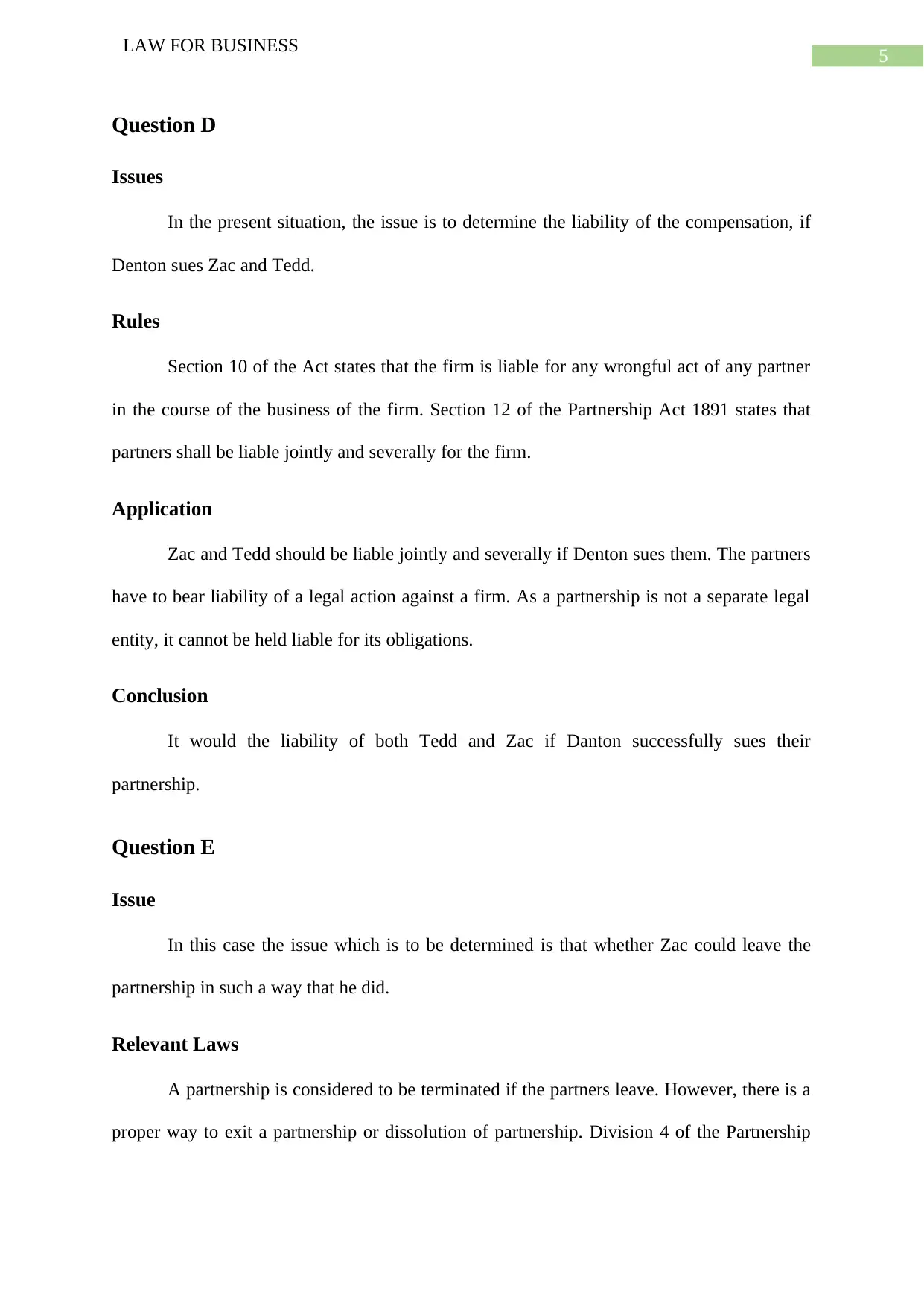
5
LAW FOR BUSINESS
Question D
Issues
In the present situation, the issue is to determine the liability of the compensation, if
Denton sues Zac and Tedd.
Rules
Section 10 of the Act states that the firm is liable for any wrongful act of any partner
in the course of the business of the firm. Section 12 of the Partnership Act 1891 states that
partners shall be liable jointly and severally for the firm.
Application
Zac and Tedd should be liable jointly and severally if Denton sues them. The partners
have to bear liability of a legal action against a firm. As a partnership is not a separate legal
entity, it cannot be held liable for its obligations.
Conclusion
It would the liability of both Tedd and Zac if Danton successfully sues their
partnership.
Question E
Issue
In this case the issue which is to be determined is that whether Zac could leave the
partnership in such a way that he did.
Relevant Laws
A partnership is considered to be terminated if the partners leave. However, there is a
proper way to exit a partnership or dissolution of partnership. Division 4 of the Partnership
LAW FOR BUSINESS
Question D
Issues
In the present situation, the issue is to determine the liability of the compensation, if
Denton sues Zac and Tedd.
Rules
Section 10 of the Act states that the firm is liable for any wrongful act of any partner
in the course of the business of the firm. Section 12 of the Partnership Act 1891 states that
partners shall be liable jointly and severally for the firm.
Application
Zac and Tedd should be liable jointly and severally if Denton sues them. The partners
have to bear liability of a legal action against a firm. As a partnership is not a separate legal
entity, it cannot be held liable for its obligations.
Conclusion
It would the liability of both Tedd and Zac if Danton successfully sues their
partnership.
Question E
Issue
In this case the issue which is to be determined is that whether Zac could leave the
partnership in such a way that he did.
Relevant Laws
A partnership is considered to be terminated if the partners leave. However, there is a
proper way to exit a partnership or dissolution of partnership. Division 4 of the Partnership
⊘ This is a preview!⊘
Do you want full access?
Subscribe today to unlock all pages.

Trusted by 1+ million students worldwide
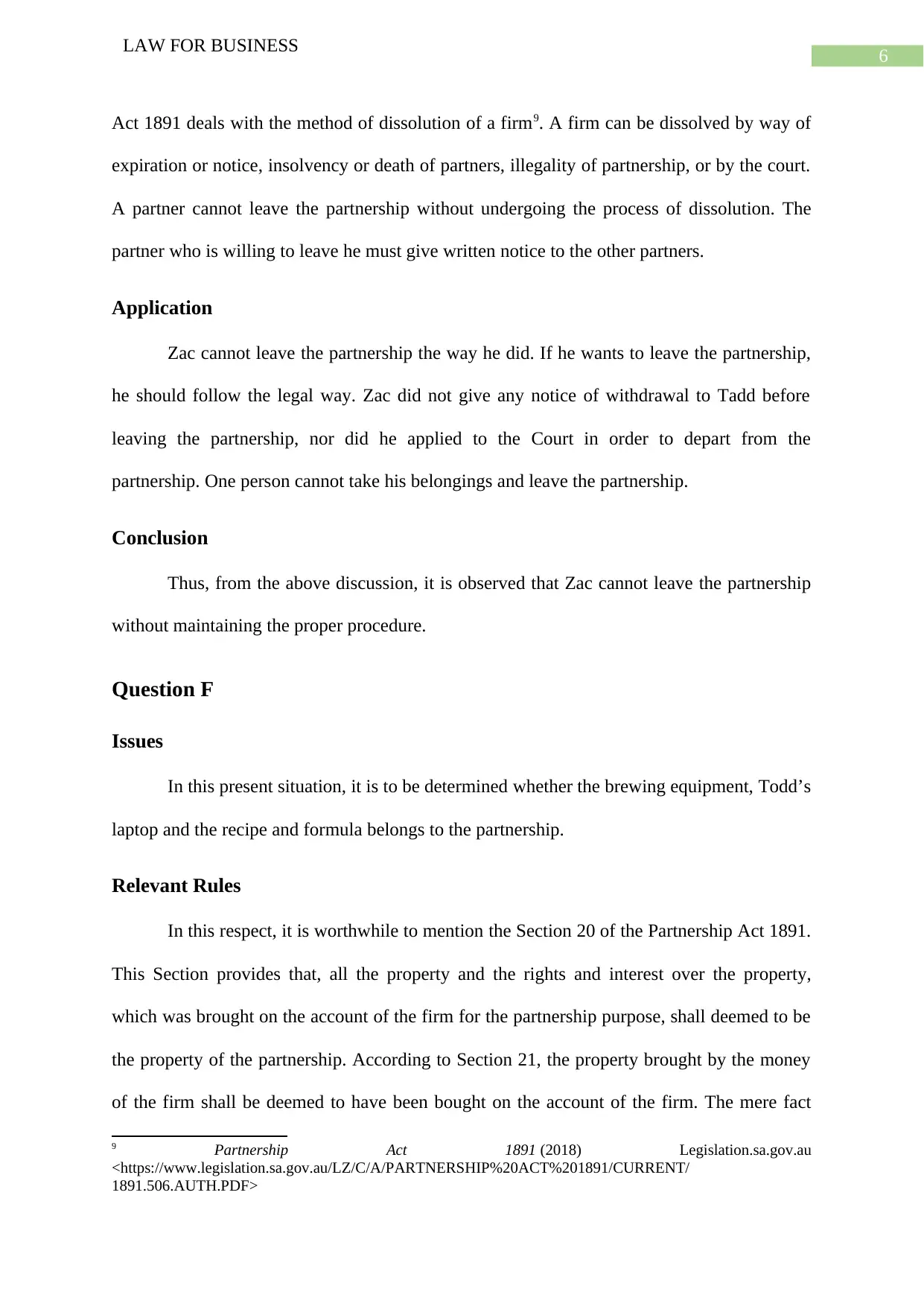
6
LAW FOR BUSINESS
Act 1891 deals with the method of dissolution of a firm9. A firm can be dissolved by way of
expiration or notice, insolvency or death of partners, illegality of partnership, or by the court.
A partner cannot leave the partnership without undergoing the process of dissolution. The
partner who is willing to leave he must give written notice to the other partners.
Application
Zac cannot leave the partnership the way he did. If he wants to leave the partnership,
he should follow the legal way. Zac did not give any notice of withdrawal to Tadd before
leaving the partnership, nor did he applied to the Court in order to depart from the
partnership. One person cannot take his belongings and leave the partnership.
Conclusion
Thus, from the above discussion, it is observed that Zac cannot leave the partnership
without maintaining the proper procedure.
Question F
Issues
In this present situation, it is to be determined whether the brewing equipment, Todd’s
laptop and the recipe and formula belongs to the partnership.
Relevant Rules
In this respect, it is worthwhile to mention the Section 20 of the Partnership Act 1891.
This Section provides that, all the property and the rights and interest over the property,
which was brought on the account of the firm for the partnership purpose, shall deemed to be
the property of the partnership. According to Section 21, the property brought by the money
of the firm shall be deemed to have been bought on the account of the firm. The mere fact
9 Partnership Act 1891 (2018) Legislation.sa.gov.au
<https://www.legislation.sa.gov.au/LZ/C/A/PARTNERSHIP%20ACT%201891/CURRENT/
1891.506.AUTH.PDF>
LAW FOR BUSINESS
Act 1891 deals with the method of dissolution of a firm9. A firm can be dissolved by way of
expiration or notice, insolvency or death of partners, illegality of partnership, or by the court.
A partner cannot leave the partnership without undergoing the process of dissolution. The
partner who is willing to leave he must give written notice to the other partners.
Application
Zac cannot leave the partnership the way he did. If he wants to leave the partnership,
he should follow the legal way. Zac did not give any notice of withdrawal to Tadd before
leaving the partnership, nor did he applied to the Court in order to depart from the
partnership. One person cannot take his belongings and leave the partnership.
Conclusion
Thus, from the above discussion, it is observed that Zac cannot leave the partnership
without maintaining the proper procedure.
Question F
Issues
In this present situation, it is to be determined whether the brewing equipment, Todd’s
laptop and the recipe and formula belongs to the partnership.
Relevant Rules
In this respect, it is worthwhile to mention the Section 20 of the Partnership Act 1891.
This Section provides that, all the property and the rights and interest over the property,
which was brought on the account of the firm for the partnership purpose, shall deemed to be
the property of the partnership. According to Section 21, the property brought by the money
of the firm shall be deemed to have been bought on the account of the firm. The mere fact
9 Partnership Act 1891 (2018) Legislation.sa.gov.au
<https://www.legislation.sa.gov.au/LZ/C/A/PARTNERSHIP%20ACT%201891/CURRENT/
1891.506.AUTH.PDF>
Paraphrase This Document
Need a fresh take? Get an instant paraphrase of this document with our AI Paraphraser
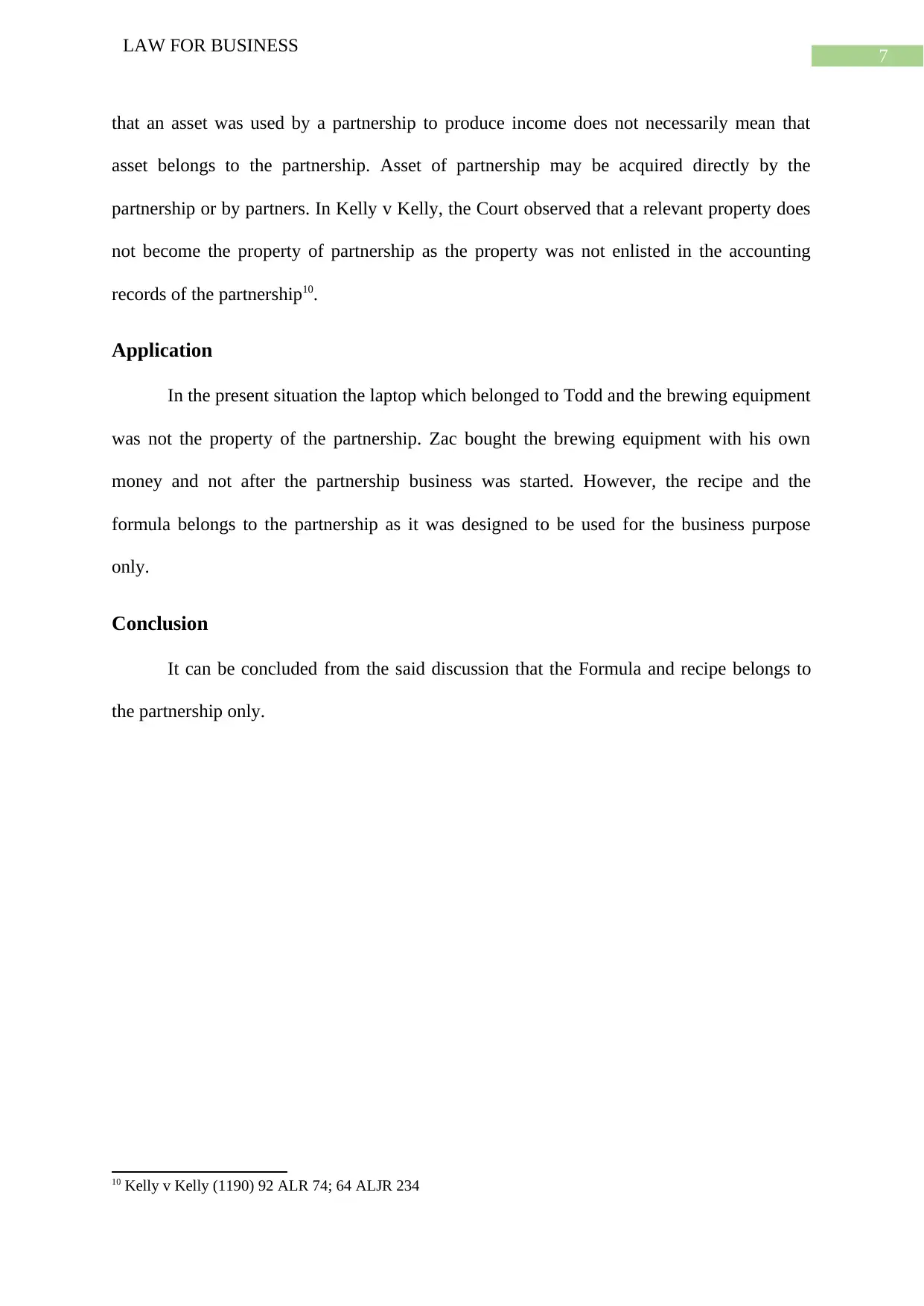
7
LAW FOR BUSINESS
that an asset was used by a partnership to produce income does not necessarily mean that
asset belongs to the partnership. Asset of partnership may be acquired directly by the
partnership or by partners. In Kelly v Kelly, the Court observed that a relevant property does
not become the property of partnership as the property was not enlisted in the accounting
records of the partnership10.
Application
In the present situation the laptop which belonged to Todd and the brewing equipment
was not the property of the partnership. Zac bought the brewing equipment with his own
money and not after the partnership business was started. However, the recipe and the
formula belongs to the partnership as it was designed to be used for the business purpose
only.
Conclusion
It can be concluded from the said discussion that the Formula and recipe belongs to
the partnership only.
10 Kelly v Kelly (1190) 92 ALR 74; 64 ALJR 234
LAW FOR BUSINESS
that an asset was used by a partnership to produce income does not necessarily mean that
asset belongs to the partnership. Asset of partnership may be acquired directly by the
partnership or by partners. In Kelly v Kelly, the Court observed that a relevant property does
not become the property of partnership as the property was not enlisted in the accounting
records of the partnership10.
Application
In the present situation the laptop which belonged to Todd and the brewing equipment
was not the property of the partnership. Zac bought the brewing equipment with his own
money and not after the partnership business was started. However, the recipe and the
formula belongs to the partnership as it was designed to be used for the business purpose
only.
Conclusion
It can be concluded from the said discussion that the Formula and recipe belongs to
the partnership only.
10 Kelly v Kelly (1190) 92 ALR 74; 64 ALJR 234
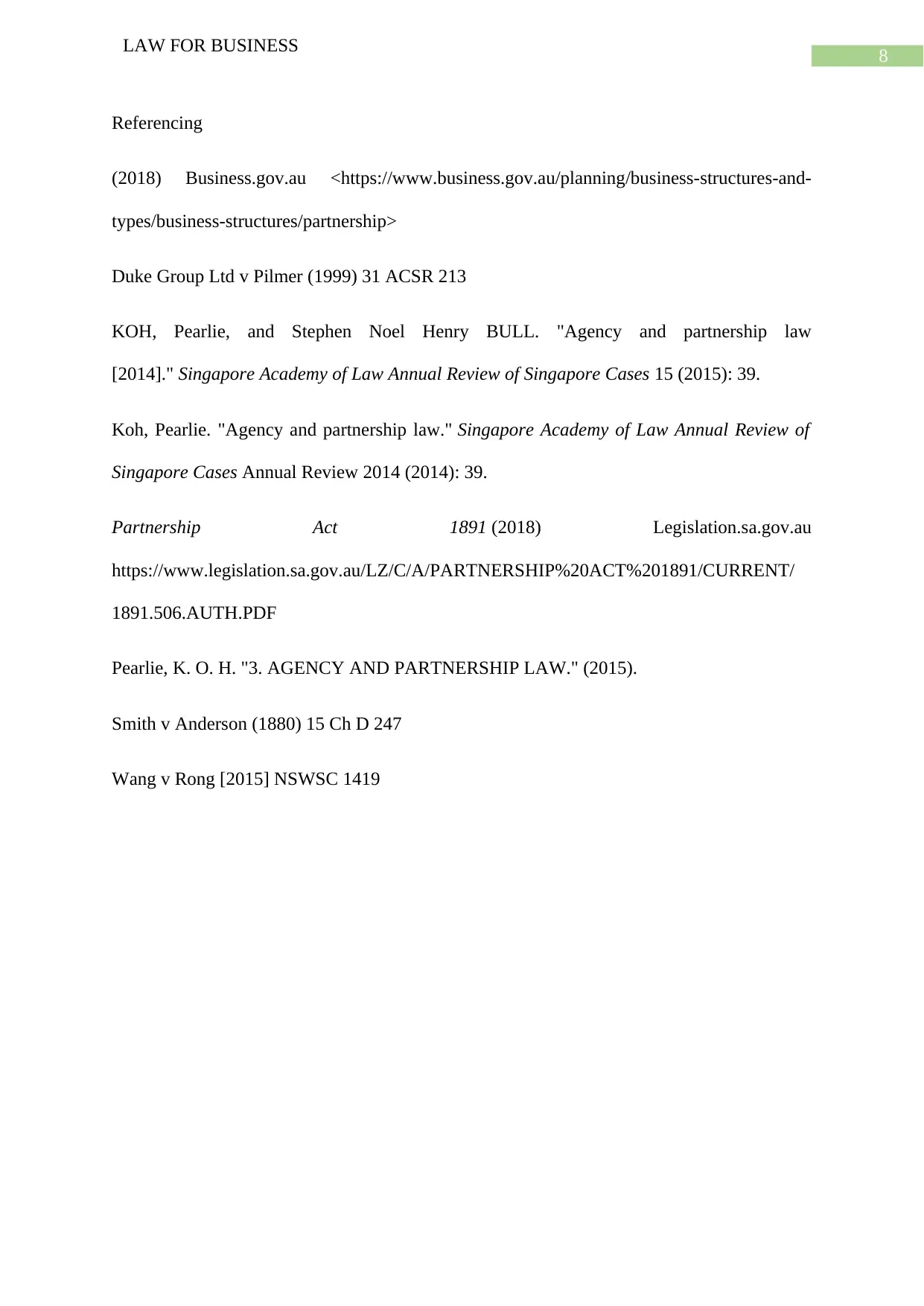
8
LAW FOR BUSINESS
Referencing
(2018) Business.gov.au <https://www.business.gov.au/planning/business-structures-and-
types/business-structures/partnership>
Duke Group Ltd v Pilmer (1999) 31 ACSR 213
KOH, Pearlie, and Stephen Noel Henry BULL. "Agency and partnership law
[2014]." Singapore Academy of Law Annual Review of Singapore Cases 15 (2015): 39.
Koh, Pearlie. "Agency and partnership law." Singapore Academy of Law Annual Review of
Singapore Cases Annual Review 2014 (2014): 39.
Partnership Act 1891 (2018) Legislation.sa.gov.au
https://www.legislation.sa.gov.au/LZ/C/A/PARTNERSHIP%20ACT%201891/CURRENT/
1891.506.AUTH.PDF
Pearlie, K. O. H. "3. AGENCY AND PARTNERSHIP LAW." (2015).
Smith v Anderson (1880) 15 Ch D 247
Wang v Rong [2015] NSWSC 1419
LAW FOR BUSINESS
Referencing
(2018) Business.gov.au <https://www.business.gov.au/planning/business-structures-and-
types/business-structures/partnership>
Duke Group Ltd v Pilmer (1999) 31 ACSR 213
KOH, Pearlie, and Stephen Noel Henry BULL. "Agency and partnership law
[2014]." Singapore Academy of Law Annual Review of Singapore Cases 15 (2015): 39.
Koh, Pearlie. "Agency and partnership law." Singapore Academy of Law Annual Review of
Singapore Cases Annual Review 2014 (2014): 39.
Partnership Act 1891 (2018) Legislation.sa.gov.au
https://www.legislation.sa.gov.au/LZ/C/A/PARTNERSHIP%20ACT%201891/CURRENT/
1891.506.AUTH.PDF
Pearlie, K. O. H. "3. AGENCY AND PARTNERSHIP LAW." (2015).
Smith v Anderson (1880) 15 Ch D 247
Wang v Rong [2015] NSWSC 1419
⊘ This is a preview!⊘
Do you want full access?
Subscribe today to unlock all pages.

Trusted by 1+ million students worldwide
1 out of 9
Related Documents
Your All-in-One AI-Powered Toolkit for Academic Success.
+13062052269
info@desklib.com
Available 24*7 on WhatsApp / Email
![[object Object]](/_next/static/media/star-bottom.7253800d.svg)
Unlock your academic potential
Copyright © 2020–2026 A2Z Services. All Rights Reserved. Developed and managed by ZUCOL.



